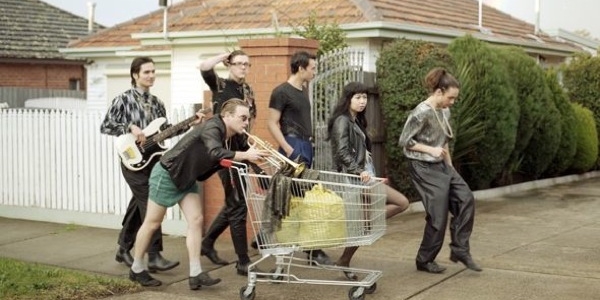“The history of the band is that it’s been me doing self-recordings and teaching myself to record along the way,” Oogjes explains. “When I was first recording I was using Sound Recorder on Windows, the most basic thing you could imagine, so for this album there was a bit of me recording us. We also got a grant from Arts Victoria and were able to use a couple of studios to record the live elements of the band as well. I then spent nine months adding layers, timbales, percussion and a heap of other sounds. The idea was to capture not what we actually sound like live but what the songs sound like in my head and I think we achieved that.”
The debut album, Life, is a sonic paradox with reviewers attaching themselves and their descriptors to either the exotic, universal elements or the Australiana feel. The album is both and the lyrics take the idea of dichotomy even further. “The more I’ve had to start talking about the album, the more I’ve realised how many contradictions there are in the intentions of the project,” he says.
“I don’t think that’s necessarily a bad thing. When I first started, I was really into the Australian identity, especially in music, and the idea you have to have that Drones-style, guitar-driven sound, even back to Midnight Oil and Hunters and Collectors and I was wondering why music can’t be about something else given that even that music is steeped in Americana traditions. I was interested in the exotic and why that expression can be seen as Australian.”
The exploration of who Oogjes is and what surrounds him is the hook upon which this album hangs. “That idea of life in a broader sense is still there but it’s really narrowed down to that sort of suburban idea and getting to the root of where your inspiration comes from and being honest,” he explains. “We’re a band from the suburbs, even though people like to think of themselves as cosmopolitan, the general public seems to like to think of themselves as that, but there’s just as much inspiring and weird and exotic things happening everywhere else.”
After all, life is about all of the bits in between the stuff of most art and is often simply spent waiting. Waiting for the next exciting, heartbreaking, terrifying or fulfilling thing to happen, waiting for something to arrive or another thing to pass and by ignoring the mundane, Oogjes feels that honesty is jeopardised. “The mundane can be overlooked in art in general and especially in the indie scene,” he says. “Everything is treated as all absolutes and there’s nothing in between.
“A visual artist who is one of the most inspirational to me is Howard Arkley, he did that Nick Cave portrait and his claim to fame in the ‘80s and ‘90s was painting suburban houses with odd colours. I live in a house that looks very much like those houses. He was cosmopolitan and cultural but he lived out in Oakley for a good part of his life and he painted what was around him. People don’t seem to want to feel their area; I’m not embarrassed about being from the suburbs and you simply have to be as honest about who and where you are as you can be.”
Expectation isn’t something Oogjes buys into. Having been in a number of different bands he seems to be seeking out purity in his art. Success may come and go but if success is at the price of dishonesty and artistic sacrifice then it hardly seems worth it. Musical projects can be like relationships in a way and when you have been through enough of them, like Oogjes has, you begin to reprioritise. He knows what he wants and is willing to allow music, opportunity and plans arrive as fluidly and organically as they chose.
“We’ve really enjoyed doing this album and getting it out to people and after we’ll look to the next project,” he says philosophically. “If it’s a different set-up, it’s a different set-up and if it takes five years, it takes five years or if it takes two months, you know? I couldn’t have gotten to the point of being so relaxed about things and letting things happen as they do without going through other bands. You learn a lot of lessons in all the bands you have. When you’re younger you think, ‘I’ll play this show even though we don’t want to for whatever reason,’ and as you get older you realise you don’t have to do anything you don’t want to do.” And usually, the music is all the better for it.
BY KRISSI WEISS







